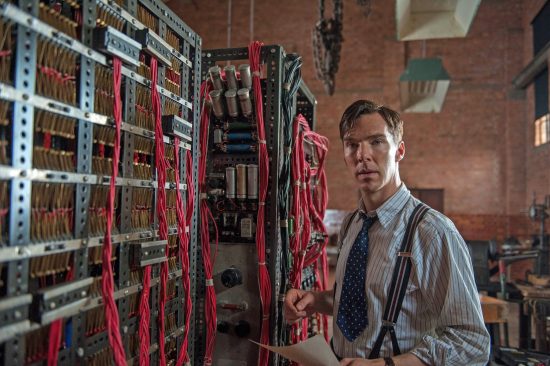Review: The Imitation Game
I’m fond of a cryptic crossword – all those hidden meanings in a prosaic black and white grid. I’ve pretty much cracked The Observer’s Everyman. However, completing The Times cryptic is still out of reach. Putting the seemingly pointless ability to solve cryptic clues front and centre is a clever way to introduce viewers to The Imitation Game. Based on the book by Andrew Hodges, this film delves into the life and works of the father of computing – Alan Turing, starring Benedict Cumberbatch as the cryptography anti-hero. He is ably supported by top-class masters of received pronunciation and codebreaking, Keira Knightley, Charles Dance and Matthew Goode, as well as Allen Leech (with a lovely Scots burr) and Rory Kinnear’s suspicious Mancunian detective.
Although a film focussing on WW2, the Enigma machine and beating those ruddy Germans has already been done (2001’s Enigma) there is enough in The Imitation Game to warrant its making, not least the showcasing of both Turing’s contribution to modern computing/code-breaking and Cumberbatch’s acting skills. The film dutifully honours one of the greatest minds that England has produced, while showing how diabolically he was treated by those who did not understand him (for both his definite homosexuality and possible Asperger’s Syndrome). Benedict Cumberbatch plays the titular antihero with reservation and respect, giving the impression that he now reveres Turing in the same way that audiences are encouraged to do so by director Morten Tyldum’s sympathetic film. The usage of narration helps to set this up as Turing’s story first and German code-breaking history second, jumping around in time from Turing at boarding school to after the War.
Although Turing is the focus of The Imitation Game, he is certainly not the only commendable thing about it. As fellow codebraker John Cairncross, Leech’s expanding girth and soft brogue are perfectly pitched, a human foil to Turing’s robotic genius. Matthew Goode is well cast as a spiky code cracker and Mark Strong makes an excellent Mi6 man with all the best lines. Kinnear is spot on, albeit his role is more to move the story on than anything more exciting.
The Imitation Game is a study of entrenched societal discrimination filled with sadly old-fashioned and oddly humorous examples of mistreatment. Knightley is as good as ever, teasing out her anger at unjustness while adopting practical approaches to her situation. Tyldum cleverly shows her character Joan not just as bright, but astute in ways that Turing never was, humanising the genius.
Although Cumberbatch is quick to tell viewers that Turing is simply not ‘Sherlock in tweed’, comparisons will be made. Personally, I felt that there was a greater relationship between Turing and Sheldon Cooper from The Big Bang Theory. The autism scale is greedily mined for comic effect, necessary but heavy-handed. My only real criticism is that the film contains ridiculously obvious and needless foreshadowing (“we’re making a…computer?”).
Still so shocking to recall the customary treatment of homosexuality during Turing’s life, both his pardon last year and this movie were long overdue. A well-made and interesting historical thriller, you’ll leave The Imitation Game feeling respect and disgust for our recent past. Cumberbatch may well be honoured come awards season, but we can never truly repay the real hero (or villain, depending on how you view computers) for his contribution to society, we can only hope to learn from his story.










